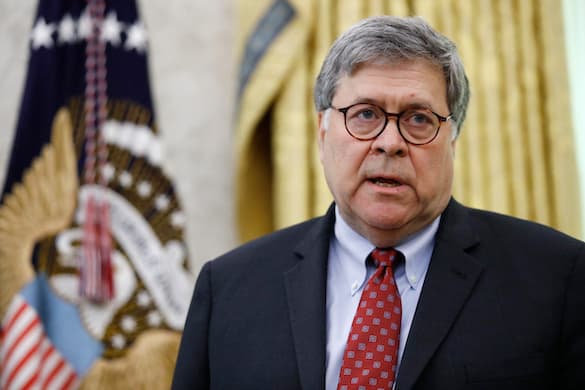Yes, Barr Focuses on Trump, but He Also Dissects the Many Problems With the Far Left
The modern left, the former attorney general concludes, has an ‘incipient totalitarian style’ that is ‘poisoning America’s political life.’

‘One Damn Thing After Another: Memoirs of an Attorney General’
By William P. Barr
William Morrow, 608 pages
William Barr’s conflict with President Trump has been the main focus of the wide press coverage of the former attorney general’s new memoir, “One Damn Thing After Another.” Ignored is how much Mr. Barr ascribes the deepest problems facing America to what he calls “the Democratic Party’s lurch to the left.”
First, the fallout with Mr. Trump. According to Mr. Barr, the president by the end of his term at the White House had “lost his grip” and become “manic and unreasonable,” “off the rails.” He was heeding the advice of “whack jobs.”
In November 2020 Mr. Trump accused the Department of Justice of failing to sufficiently investigate the presidential election that he claimed was stolen. Mr. Barr concluded that, “to date, we have not seen fraud on a scale that could have effected a different outcome in the election.” Mr. Trump disagreed.
The two men had an intense disagreement, to the point that Mr. Barr left the West Wing thinking he no longer had a job. Two of the president’s attorneys chased his car down and informed him that they still needed his services.
That scene has been the focus of much of the media coverage about “One Damn Thing After Another.” Less attention has been on Mr. Barr’s broader political philosophy, which finds the source of much of America’s problems to be the Democratic Party’s left wing.
“Some liberal and progressive commentators suggested that our polarizing politics was somehow the consequence of an upsurge in right-wing extremism,” Mr. Barr writes, “but no sentient person could take that seriously.”
He observes: “Liberal democratic ideals — strict limits on governmental power, individual rights, press freedom, religious liberty — were framed within the great Anglo-American tradition and are the life’s blood of our Republic.” Mr. Barr offers that this tradition was “painstakingly wrought over many centuries from a rich amalgamation of influences,” among them classical philosophy, Christian precepts, “Anglo-Saxon folkways,” the Enlightenment, the American Revolution, and the common law.
“Under liberal democracy,” he writes, “it is not the role of the state to use its coercive power to remake man and society according to some abstract conception of perfection.”
The modern left, the former attorney general concludes, has an “incipient totalitarian style” that is “poisoning America’s political life.” The left has adopted “the same kind of revolutionary and totalitarian ideas that propelled the French Revolution, the Communists of the Russian Revolution, and the Fascists of twentieth-century Europe.”
In sum: “Radical progressivism’s core idea is that there is a preordained scheme of natural earthly perfection toward which man and society must be led inexorably by the march of history.”
Mr. Barr recalls that what convinced him to return as attorney general under Mr. Trump was the politicization of governmental agencies: “the suspect Russian collision narrative had drawn the Department of Justice and the FBI into the political maelstrom, and many Americans sensed — with some justification — that powerful Washington politicians were using the criminal justice system as a political weapon.”
Mr. Barr calls the charges that Russia helped Mr. Trump win the 2016 election bogus, saying they were “mendacious and fraudulent attempts to invalidate the legitimate election of an American President.”
Because he had no intention of serving again after Mr. Trump left office, Mr. Barr felt he could be an independent authority without an agenda. He also thinks Mr. Trump could have won in 2020 with “a minor adjustment in his behavior.” Looking at election maps, he concludes that Mr. Trump lost suburban voters — who may have been put off by his abrasive style.
Mr. Barr also served as attorney general under President George Herbert Walker Bush. “One Damn Thing After Another” recounts more than just his time with Mr. Trump.
His parents were professors at Columbia University, and the family lived on the Upper West Side. Mr. Barr worked for the CIA before going to the Department of Justice in 1989. He became attorney general in 1991 and served until 1993, and then returned in 2019 to serve for a year in the Trump administration.
In his book Mr. Barr quips that while he is not the only attorney general to serve twice (the other was John J. Crittenden), he is the only one to serve “in two different centuries.”

